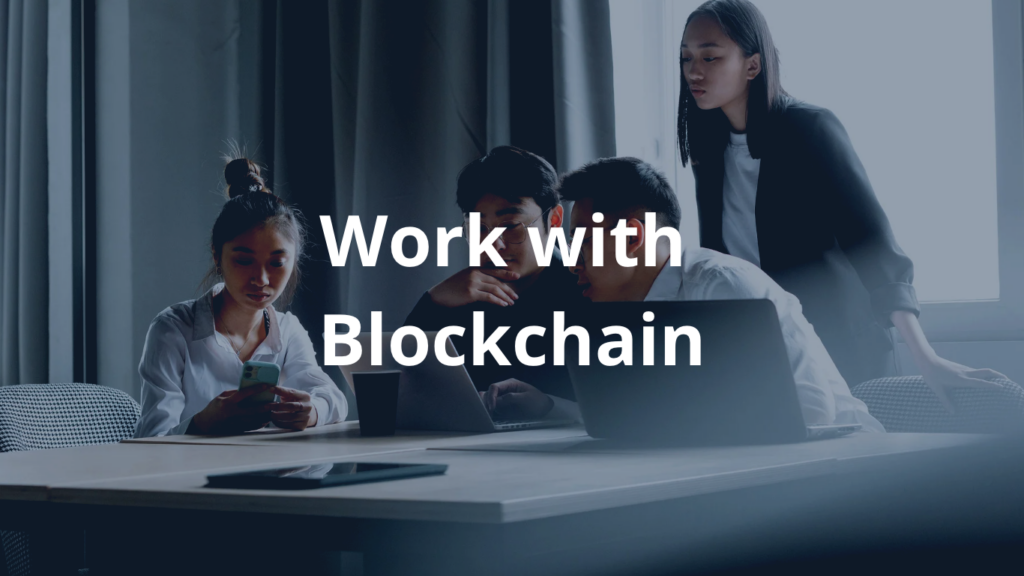Blockchain technology has the potential to completely transform how the digital world manages data and conducts commerce. Blockchain was initially developed as a platform for Bitcoin, but it is now exhibiting a level of adaptability and security that has caused various commercial and governmental sectors to take notice and start using it.
Given this, it makes sense that you should think about becoming a Blockchain developer if you want to start a career with a lot of room for advancement and use cutting-edge new technology just emerging.
How to work with blockchain
To work with blockchain, you will need to have a basic understanding of the technology and how it works. Here are some steps you can follow to get started:
Research and learn about the basics of blockchain technology, including how it is used to securely store and transfer data.
Consider the specific use case or application for which you want to use blockchain technology. This will help you determine the type of blockchain platform or technology that is best suited for your needs.
Choose a blockchain platform or technology to work with. There are many different blockchain platforms and technologies available, each with its own unique features and capabilities.
Set up a blockchain network or join an existing one. Depending on the platform or technology you are using, this may involve installing software, creating accounts, and configuring settings.
Develop or integrate your application with the blockchain network. This may involve writing code, using pre-built tools or libraries, and testing to ensure that your application is functioning properly.
Once your application is ready, you can begin using it on the blockchain network to securely store and transfer data.
Overall, working with blockchain technology involves a combination of learning, planning, and development. It is important to carefully consider your use case and choose the right platform or technology to ensure that your application is secure and reliable.
There are a wide variety of jobs in the blockchain industry, ranging from technical roles such as software development and network administration, to non-technical roles such as business development and marketing. Some common types of jobs in the blockchain industry include:
Blockchain Developer: A blockchain developer is responsible for designing, implementing, and maintaining blockchain-based applications and systems.
Blockchain Engineer: A blockchain engineer specializes in the design and implementation of blockchain technology and networks.
Blockchain Project Manager: A blockchain project manager is responsible for planning and coordinating blockchain-related projects, including coordinating the work of development teams and ensuring that project timelines are met.
Blockchain Consultant: A blockchain consultant provides expert advice and guidance on the implementation and use of blockchain technology in various industries and applications.
Blockchain Analyst: A blockchain analyst conducts research and analysis on blockchain technology and its applications, providing valuable insights and recommendations to stakeholders.
Blockchain Marketer: A blockchain marketer is responsible for promoting and marketing blockchain-based products and services to potential customers.
Overall, the blockchain industry offers a wide range of job opportunities for individuals with a variety of skills and expertise.
One of the biggest cryptocurrency exchanges in the world is called Binance. In 2017, the exchange was established and registered. Binance, which started as an Ethereum branch, created its own technology named Binance Smart Chain in 2020. (BSC).
Binance is willing to support a wide range of projects from novice to experienced teams. To start developing, a range of materials, tutorials, and tools are accessible. Binance may also assist by fostering communication and connecting other developers and community members to discuss problems and exchange insights. Scaling options are also provided by Binance for partners and expanding businesses.
Solana
The Solana Foundation takes pleasure in democratizing not only the internet through blockchain but also the world’s financial system. Members will receive the whole package, including milestone grants, VC introductions, technical help, recruiting advisory, and marketing assistance, if they are accepted.
Anyone, including universities, teams, schools, organizations, the government, and individuals, who has a feasible and promising project idea is eligible to apply for the grants.
An example of currently accessible domains is the list of project domains that was previously provided. The business is open to new initiatives and endeavors that support the Solana foundation’s goals.
Read more
Avalanche
Avalanche is a platform for creating your own decentralized applications and blockchain networks. The Avalanche Network, developed by Ava Labs, is one of many initiatives vying with Ethereum to become the most widely used smart contract network in the blockchain environment.
A richer ecosystem of scalable application-specific blockchains is made possible by this grant, which provides up to USD 290M and is focused on accelerating the adoption and growth of its first “subnet” functionality. Although creating your own blockchain is the main goal, DeFi, Not, and other application kinds are also welcome.
Read more
Lisk
Lisk is a platform for creating blockchain applications, which are unique programs made to run on a network of computers with the same software.
For creating Blockchain Applications using the Lisk SDK, Javascript developers can apply for grants from the Lisk Grant Program worth up to 60,000 CHF. You can use the grant program’s various waves to apply for funding and implement your idea.
Read more
Summary
These programs provide a unique chance to develop a network of decentralized applications and blockchain use-cases at an early stage. Take your time to examine the various blockchain programs’ offerings and weigh them against your knowledge, availability, and dedication. Making an application can take some time, so it’s advised to look into the various programs’ online communities to gain a better grasp of the application process.

